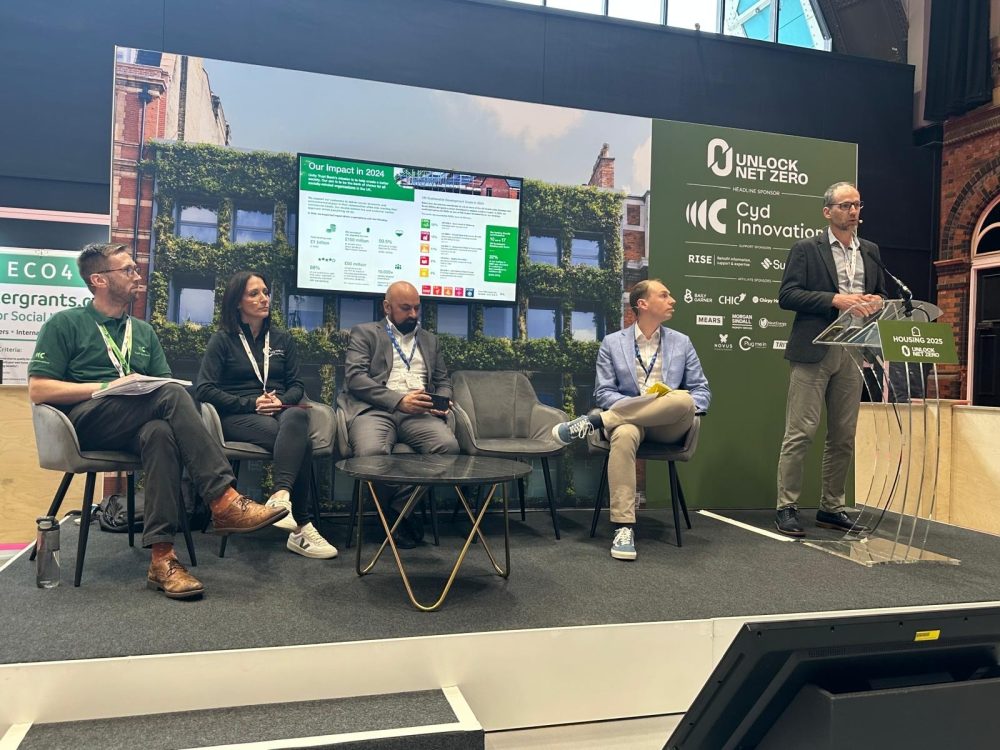
Unlocking the Door to Net-Zero Housing
Latest NewsUnlocking the Door to Net-Zero Housing
Published: June 25, 2025
As a financial organisation with a mission to create a better society, we recognise the important contribution we can make to the UK’s transition to a carbon-neutral economy.
By leveraging customer insights and deploying sector expertise alongside specialist external partners, we continue to develop products and services that help organisations to maximise their impact. As part of this, we’re committed to ensuring customers can access finance to fund their own net-zero journeys.
To meet the UK’s commitment to achieve a net zero-carbon economy by 2050, there is an urgent focus on the decarbonisation of housing. This includes supporting housing associations, which manage 2.9 million homes in England alone.
Here, Matt Conroy, Head of Impact Propositions at Unity Trust Bank, discusses how our Retrofit Transition Initiative is helping customers to unlock a net-zero future.
Not-for-profit housing associations play a vital role in society. Through the provision of safe and affordable homes, they are improving the lives of residents and building the foundations for healthy and happy communities.
With more than four decades of experience working with housing associations – through transactional banking, lending and deposits – our specialist team has witnessed how the sector is under increasing pressure to decarbonise properties, whilst continuing to address the UK’s housing crisis.
From installing solar panels and heat pumps, to replacing glazing and improving insulation, practical upgrades can prove costly and complex – particularly for those with properties across multiple locations.
While government initiatives like the Social Housing Decarbonisation Fund (SHDF) provide valuable support, smaller operators are still experiencing challenges in securing long-term finance at an affordable rate. In fact, research suggests that an additional £36bn is needed on top of the £70bn that has already been committed by UK housing associations to ensure their homes are certified EPC ‘C’ or above by 2030.
Alongside the clear environmental benefits, supporting customer ambitions to deliver affordable and energy efficient homes is critical for overcoming fuel poverty and ensuring the wellbeing of some of society’s most vulnerable individuals.
That’s why we developed the Unity Retrofit Transition Initiative (RTI) – a ringfenced fund that is designed specifically to support housing associations in enhancing the safety, comfort and warmth of their tenants’ homes.
Funding for a greener future
Since launching the RTI fund with an original £25million commitment, we experienced a rapid take-up of funding from customers across the UK looking to decarbonise their properties through retrofitting activities. By the end of 2024, we doubled the fund to £50million, providing up to £3million per customer to support their retrofit investments.
What makes RTI special isn’t just the money available – it’s how we’ve structured it for our customers:
- Accessible pricing: Housing associations borrow funds at an interest rate that is lower than traditional loan facilities.
- Flexible funding: Unlike traditional financing, borrowers have the freedom to forward plan and allocate their budget to specific requirements in advance, drawing down on expenses as needed. RTI funding may be available for qualifying capital expenditure from previous years, which could help improve business liquidity. Eligibility and outcomes depend on individual circumstances.
- Enhanced support: In addition to financial support, we can facilitate third-party products, services and environmental assessments to review the potential climate impact on their properties and help them establish the most effective investment strategies.
Beyond lending
With a team of five relationship managers specialising in finance for housing associations, we understand the unique operational challenges within the sector. We know that behind every loan is a person whose life will be improved, so the RTI fund isn’t just designed to improve energy efficiency. The resulting impact supports jobs, benefits local supply chains, and ensures vulnerable people have a more comfortable place to call home.
RTI is a prime example of our double bottom line strategy, where profit is measured against purpose. As we continue to build upon the initiative and develop products like our impact toolkit, which help customers to assess, measure and report on their impact, we can collectively further our mission to create a better society.
Matt Conroy spoke at the Housing Conference 2025 on 24 June, as part of the panel: “Unlocking private sector investment for retrofit”.
To learn more about the RTI fund, which is nominated for an Unlock Net Zero Award, speak to your relationship manager.
[i] https://www.housing.org.uk/about-housing-associations/about-social-housing/impact-of-housing-associations2
[ii] https://www.housing.org.uk/globalassets/files/climate-and-sustainability–energy-crisis/nhf-evidence-submission-to-public-accounts-committee-pac-inquiry-into-decarbonising-home-heating-april-2024.pdf